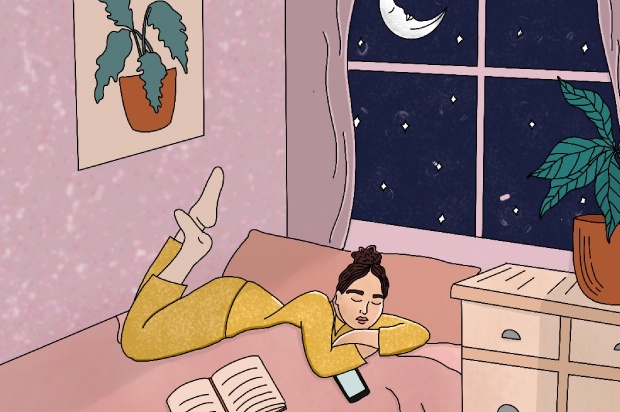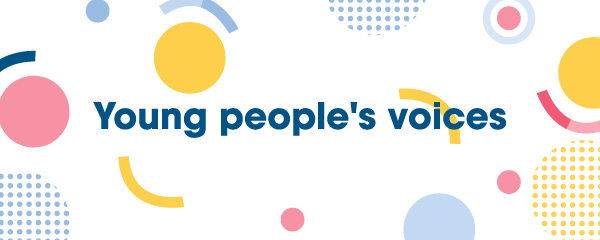Ambassador voices: Sleep and mental health


My name is Rachel Elder. I am an English Literature student at the University of Edinburgh and a Young Ambassador for The Mix, most recently involved in The Body and Soul Club.
Problems with sleep
We are all taught from a young age that getting enough sleep is essential in order to function at our best during our daily routines. However, sleep is also a key indicator of mental health, particularly amongst students and young people.
However, when our schedules become increasingly hectic and overwhelming, or if there are big changes in our lives, our sleep and mental health can often begin to suffer. Although most of us will notice a deterioration in our wellbeing, many of us can find it difficult to know where the problem begins and how to initiate positive changes.
Sleep and coronavirus
Throughout my late teenage years I have experienced periods of insomnia, however the current situation with COVID-19 may spark anxiety and can also have a negative impact on people’s mental wellbeing and sleep patterns, even if that person has never experienced anything like this before. This is why it’s so important for us to be aware of how we can maintain a healthy routine around sleep during this time.
My experience of sleeping too much
When I began university, I still clung to my perfectly reliable routine that I had stuck to all throughout high school, with the hope that it would carry me through higher education too.
A month into my first semester these hopes vanished and I found myself failing to wake up on time. Despite being a very dedicated student, my motivation plummeted as I experienced a permanent state of exhaustion. My alarm would go off each morning and I would struggle to stay awake for long enough to drag myself from bed to join the land of the living, even missing lectures as a result.
My experience of insomnia
From this month of hibernation, I entered a period of insomnia. It had taken me weeks to realise that my over-sleeping and lack of motivation was due to a feeling that no amount of effort would be enough to achieve the academic success that I hoped for.
Looking back now, it is clear that my mental health was suffering at this time, but in the moment I failed to realise this and instead became increasingly anxious about the month that I had ‘wasted’ sleeping instead of studying.
This anxiety drove me into endless hours of studying and sleepless nights spent in the library. Even when I did lock my books away, I would find myself lying awake in bed, my brain unable to switch off and surrender to sleep.
How has the pandemic affected sleep?
Starting university, moving away from home and being surrounded by new people was a huge change in my life. The isolation period that we are currently in due to the coronavirus has also completely altered the everyday routines of people all across the world. In these circumstances when we are faced with significant changes, it is understandable that our mental health may be impacted.
I admit that there is no way of preventing changes in our lives, but I would like to share my experience and some of the techniques that I learnt in the hope that they may help others during this challenging time.
If you are struggling with your mental health because of the pandemic you can visit The Mix’s covid support page for help and advice on lots of issues.
Sleep as a tool
Although both extremes of poor sleep are equally unpleasant, our sleep is in fact a great tool in gaging our mental health and can be easily used to our advantage. Before things escalate, we can notice changes to our sleeping patterns and try to find correlations with how our day to day lives may be causing these. We can reach out for support and make changes at an earlier stage to regain control over our body and mind.
Sleep hygiene
The simplest way to define sleep hygiene is that it is the practise of a structured routine of habits that improve the quality of our sleep. Sleep hygiene is a concept that I found to be vital in improving my sleep pattern, and in light of the corona crisis I have worked hard to ensure that these sleep hygiene techniques continue to be implemented so that my anxiety about COVID-19 does not impact my mental and physical health more than necessary.
My tips for better sleep
- I avoid caffeine late in the day
- I ensure that I don’t go to bed hungry
- I turn off all electronics 30-60 minutes before I want to go to sleep
- Instead of watching TV or scrolling through social media, I take time to read, colour or journal, allowing me time to wind down at the end of each day
How to avoid technology before bed
The advice to avoid technology may sound like white noise these days – everyone says it – but how can we possibly avoid our phones when so much of our world exists within that screen?
There’s really no easy answer. However, using technology before sleep truly does delay our sleep pattern by inhibiting the release of the hormones which help us sleep. I eventually had to decide that watching one less episode of my favourite series in order to gain the energy and life of a good night’s sleep was worthwhile.
I quite literally had to set a time each night at which I would stop going on my phone and would leave it at the opposite side of my room from my bed. I had no way of reaching for it when I was supposed to be sleeping and I was forced to get out of bed when my alarm went off in the morning.
Only after I was sure that I could resist the temptation to quickly check my messages before bed did I begin to explore how technology could actually help sleep rather than inhibit it, and I soon found the vast numbers of podcasts, relaxing playlists, or in my case, guided meditations which I find particularly useful in distancing my mind from all of the day’s activities.
Finding what works for you
It’s a matter of trial and error when it comes to finding what works for you, and everyone will be different. However, looking after our psychological wellbeing and our sleep routines is essential in these times of uncertainty.
I encourage you to look at your own sleeping patterns and seek support and structure when things start to slip away because your mental wellbeing is still a priority, even throughout this pandemic.
For more information on sleep
Read our expert guide to how much sleep you need.
Read our expert chat on sleep.
Find out more about sleep disorders.
If you’re struggling to get a good night’s sleep and you need support, get in touch with our team who are there to listen and talk through to any and every issue.
Next Steps
- Visit http://www.sleepcouncil.org.uk/ for advice and guidance on healthy sleep habits.
- Visit bemindful for more information on mindfulness and to search for a course near you.
- AnxietyUK run helplines, email support, live chats and therapy services for people with anxiety disorders. 08444 775 774
- Chat about this subject on our Discussion Boards.
By Rachel Elder
Updated on 22-Oct-2020
No featured article










